Session 15 - Philippians
Author
Paul. It is one of the four so-called Prison Epistles (letters), the others being Ephesians, Colossians and Philemon.
Date of Composition
About 62. The book of Philippians was written from Rome during the two years Paul spent there waiting for his case to be heard before Nero (see Acts 28). Paul, Timothy, Luke, and Silas first came to Philippi around 51, eleven years before he wrote this letter.
Location, Purpose and Audience
In 356 BC King Philipp of Macedonia (father of Alexander the Great) took the city and renamed it Philippi (located in the north of modern Greece). The Romans captured it in 168 BC and Octavian (Augustus) subsequently turned Philippi into a Roman colony (like a retirement village for veterans of the Roman civil wars) and military outpost. (The Government of Jordan still does this.) Better to keep rapacious legions out of Rome when not at war, otherwise they will become restless; they might even take sides and be drawn into plots. There were also expectations that soldiers on the winning side would be amply rewarded for victory.
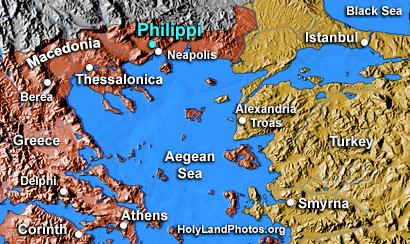
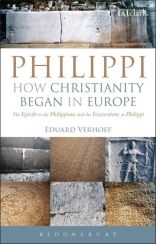
Paul and Timothy first visited Philippi in Greece during Paul's second missionary journey, which occurred between 49 and 51. Read Acts 16 for details.
Following clear guidance from the Holy Spirit, Paul went to Philippi on his second missionary journey (Acts 16:9-12), spending about three months in the city. This first visit marked Paul's (and the Gospel's) entrance into Europe. Paul first preached at a prayer meeting, where Lydia (among others) was converted. (There is no evidence of a synagogue in the city; this required at least ten Jewish men. So they had to go to where the Jews were meeting informally, which happened to be down by the river.) Lydia gave Paul a home while he continued his work in the city.
After some time there arose great opposition to Paul and the manifestation of God's power, and he and Silas were beaten and put in prison, but they were released by an earthquake which also resulted in the conversion of the jailer and his family (Acts 16). He perhaps visited them again on his journey from Ephesus to Macedonia (Acts 20 2 Cor 2:12-13; 7:5-6), spent a Passover there (Acts 20:6) and received messages from them (Phil. 4:16). They also sent him assistance and he wrote them this letter.
Paul found in the Philippian Christians many reasons for rejoicing, and now that Epaphroditus who had brought their aid to him was about to return from Rome to Philippi, he had an opportunity to send them a letter of thanks (4:18). The letter is remarkable for its tenderness, warnings, entreaties and exhortations and can be read often as a spiritual tonic.
Philippians is perhaps the most unusual letter Paul wrote. Instead of writing (primarily) to teach or correct doctrinal matters, he writes a "thank you" letter to the church that had been generous in supporting him over the years. What's more, encouraged by the "enthusiasm" of Christians in Corinth they had given generously to the needs of poor believers in Jerusalem (2 Cor 9:2), so they were known as a giving church.
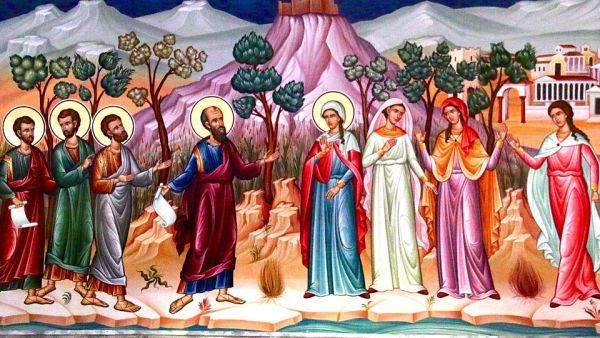
Artist's impression of conversion of Lydia.
Literary Style and Structure
- Introduction, 1:1-11.
- Paul's Present Situation and Feeling. 1:12-26.
- Some Exhortations, 1:27-2:18.
- He Plans to communicate with them, 2:19 end.
- Some Warnings, ch. 3.
- Against Judaizers, 1-16.
- Against false professors, 17 end.
- Final Exhortation. 4:1-9.
- Gratitude for Their Gifts, 4:10-19.
- Conclusion, 4:20 end.
Key Issues
Christ
Mentioned 40 times in this short letter.
- Christ is our life - 1:21
- Christ is our example - 2:5
- Christ is our hope - 3:7
- Christ is our strength and source of supply - 4:13
Growing in Faith
"I pray that your love will overflow more and more, and that you will keep on growing in knowledge and understanding. For I want you to understand what really matters, so that you may live pure and blameless lives until the day of Christ's return. May you always be filled with the fruit of your salvation - the righteous character produced in your life by Jesus Christ - for this will bring much glory and praise to God." (1:9-11)
Growing as a Christian is not just striving to be better, out of some obligation, but wanting to do so, with His power (2:13).
Unity in Humility - The Example of Jesus' Humiliation and Exaltation
Paul is concerned about division in the church; he mentions the names of those involved. Whatever they disagreed about (we have no information) mushroomed from creeping disunity into a rift that not only affected them but began to hurt the entire congregation.
"I implore Euodia and I implore Syntyche to be of the same mind in the Lord." (4:2)

Paul appeals instead to the example of Jesus, in emptying himself for us.
"Is there any encouragement from belonging to Christ? Any comfort from his love? Any fellowship together in the Spirit? Are your hearts tender and compassionate? Then make me truly happy by agreeing wholeheartedly with each other, loving one another, and working together with one mind and purpose. Don't be selfish; don't try to impress others. Be humble, thinking of others as better than yourselves. Don't look out only for your own interests, but take an interest in others, too. You must have the same attitude that Christ Jesus had. Though he was God, he did not think of equality with God as something to cling to. Instead, he gave up his divine privileges, he took the humble position of a slave and was born as a human being. When he appeared in human form, he humbled himself in obedience to God and died a criminal's death on a cross. Therefore, God elevated him to the place of highest honour and gave him the name above all other names, that at the name of Jesus every knee should bow, in heaven and on earth and under the earth, and every tongue declare that Jesus Christ is Lord, to the glory of God the Father." (2:1-11)
The meaning of "emptied Himself" has caused problems through Christian history. (Check out Philip Jenkins' detailed account: "Jesus Wars: How Four Patriarchs, Three Queens, and Two Emperors Decided What Christians Would Believe for the Next 1,500 years"). Was Jesus Christ one person or two in His "incarnation" (lit. "in the flesh")? Was he one nature or two; God or man; one at a time or simultaneously? Is there only one God, who manifested Himself differently at different times (modalism)? If he was God, how could he touch flesh (Gnosticism)? Was He spirit, a phantasm, who only appeared to be flesh (Docetism)? In fact, He was both God and man; his ministries in each respect were complimentary. He had to be God to do the work of God; He had to be human to experience humanity (more of that when we get to Hebrews).
Here are some tips the epistle gives:
"... agreeing wholeheartedly with each other, loving one another, and working together with one mind and purpose. Don't be selfish; don't try to impress others. Be humble, thinking of others as better than yourselves. Don't look out only for your own interests, but take an interest in others, too. Do everything without complaining and arguing." (2:2-4, 14)
The true worth of human success
Paul writes that there is nothing eternally worthwhile in family heritage, name, reputation, religious performance, history of devotion, possessions ... they all end up on the rubbish heap of history. What lasts is the life that we have and live in Christ. Here are our alternatives, as Christians:
- count everything else as worthless when compared with the infinite value of knowing Christ Jesus as Lord
- count all human achievement as garbage, so that we can gain Christ and become one with him
- desire to know Christ and experience the mighty power that raised him from the dead; being ready to suffer with him, sharing in his death, so that one way or another we can experience the resurrection from the dead
- press on with purpose to possess that perfection for which Jesus Christ first claimed us
- forget the past (!) and look forward to what lies ahead; press on to reach the end of the race and receive the prize for which God, through Christ Jesus, is calling us.
Rejoicing in the Lord
Philippians portrays Jesus Christ as our joy. Forms of the words joy, rejoice, and gladness (from chara in Greek = to rejoice exceedingly, to be well, thrive) appear in 16 of the letter's 104 verses. We all have much to be grateful for - true joy comes only through humble faith in the saving work of Jesus Christ, joining ourselves in harmony with His followers, and serving others in His name. This was the life experienced by the Philippian believers, and it is a life available to us today.
Those of us who have experienced God's joy find it difficult to understand those who reject it; if only they knew.
The theme of the epistle is made more powerful by the fact that Paul was in prison when he wrote it. Christian joy is deeper than people's ideas of "happiness".
"For to me, living means living for Christ" (1:21)

Let's unpack that.
Paul's joy is not dependent on his circumstances. Although he has been imprisoned for almost four years (1:12-18), he rejoices (1:18). Even if he should be sentenced to death for his ministry, he would still rejoice (2:17, 18). Paul had learned to be content, whatever his present condition (4:11). Even though he was in prison, people came to hear him preach; this gave him optimism and boldness in his ministry.
"I want you to know, my dear brothers and sisters, that everything that has happened to me here has helped to spread the Good News. For everyone here, including the whole palace guard, knows that I am in chains because of Christ. And because of my imprisonment, most of the believers here have gained confidence and boldly speak God's message without fear." (1:12-14)
Paul's joy was related to his calling and his personal experience of the free gift of God's grace (1:7). The grace he had been given was the reason he could rejoice in spite of his chains. He had an enormous passion for preaching the grace given through Christ (1:12-18). His joy came from knowing the name of Jesus was getting the attention it deserved. That's what mattered most to Paul. When our underlying joy (not circumstantial "happiness", which everyone strives to obtain and keep) lies in fulfilling our calling, the criticisms and persecutions of the world don't hold us captive.
Paul's joy was in people. His life and sense of well-being were always tied to the success in the faith of those he ministered to. He calls the Philippians "my joy and crown" and encourages them to stand fast (4:1). He urges the church to "complete my joy" (2:2). He describes in detail how they can do that (1:27—2:18). If they will accomplish it, he will be able to rejoice that his work among them has not been in vain (2:16). Self-centered people don't have that kind of feeling for others. Neither do they have much joy. The joy of Paul and the Philippians was related to the bond that joined them (2:17, 18). We don't pay enough attention to that kind of relationship these days. There should be great joy in our oneness, our fellowship, our common bond in Christ.
Finally, Paul's joy was primarily related to Christ. Paul said, "We ... glory in Christ Jesus and put no confidence in the flesh" (3:3). That is the explanation of everything else Paul said. He wanted the Philippians to know that negative circumstances did not rob him of joy because his joy was in Christ. Paul's joy was in preaching Christ and in the fellowship of the followers of Christ. Paul knew that nothing matters but knowing Him (3:3-14). We can know that when the Lord Himself is our joy (cf. Psalm 73:25) nothing can take it away. Along with Paul we can say, "Rejoice in the Lord always; again I will say, Rejoice." (4:4).

A High Calling - to be Citizens of Heaven
Roman citizenship was a coveted prize? Citizens enjoyed privileges and protections. Some of the more common benefits were the right to vote in assemblies and stand for civil or public office, the right to make legal contracts and hold property and the right of immunity from some taxes and legal obligations. In Rome, they were entitled to the dole (unlike anywhere else). They did not have to suffer the humiliation of working at a trade. Citizens also had the right to sue (and be sued) in the courts and have a legal trial where a person appeared before a proper court in which to defend themselves. Citizens could not be tortured or whipped (Ac 22:23-29), nor could they receive the death penalty, unless they were guilty of treason. Paul's right to request a trial before Caesar was used to avoid being tried in biased Jerusalem. If he went to the city from Caesarea, his murder would almost certainly occur along the way (Acts 25:1-3). We find Paul making use of his Roman citizenship in Acts 25. Paul's Roman citizenship meant he could receive treatment the common person did not have the legal right to request.
Paul came to realize (though Romans might consider it treason), that there was a greater privilege available to ALL that was of infinitely greater value than the empire could offer.
"we are citizens of heaven" (3:20)
Earthly glory, position, rank and privilege were valued but he was prepared to put it all aside to know and serve Jesus Christ. Our heavenly citizenship has eternal worth. A person could be stripped of Roman citizenship; nothing that can be thrown at us by people or the Devil can strip us of our citizenship in heaven. History moves on, so that Roman citizenship has no intrinsic value today (it no longer exists as a legal status); it is passé; however, our citizenship in God's kingdom is enduring; it is hard for some people to make the choice, but if you have an eternal perspective it is a no-brainer.
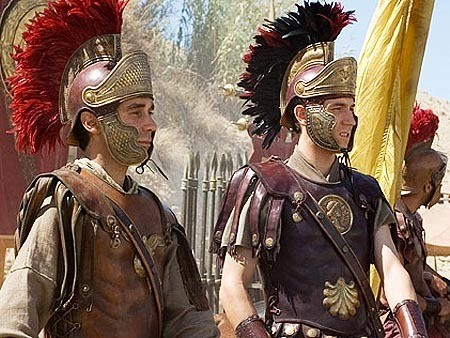
We are citizens of heaven, not driven by human priorities.
Generosity
Through our relationship with God, we come to realize that He is our supply in all things.
"God who takes care of me will supply all your needs from his glorious riches, which have been given to us in Christ Jesus" (4:19).
Read that verse again, in context; it is not an unconditional or trite "prosperity promise", as we have often been led to believe, but a recognition of God's provision as we give generously to others. It is not all about us.
The Gospel
The message of the Good News underpins everything. The Gospel is mentioned 9 times in this letter.
The Day of Christ
The New Testament is full of expectation about the return of Christ. Philippians makes mention of "the day of Christ" or "the day of Jesus Christ" three times. That is to be our focus, even if we are living surrounded by enemies (3:18-21).
Interesting Individuals
- Lydia (Acts 16) - a wealthy business woman, a "God-fearer" (the term for a Gentile who sought to know God through exposure to the Jewish community and its covenant relationship with God and teachings, without actually becoming a Jew). She was a "seller of purple", a person who traded in purple dyes and fabrics for which the city of Thyatira was noted. Purple goods were part of a high value industry and were used by emperors, senior government officials, and priests of various pagan religions. Lydia became a Christian and opened her home to Paul and his companion/s.
- Philippian Jailer (Acts 16) - he nearly commits suicide when the prison where Paul and Silas are imprisoned is destroyed by an earthquake (as a jailer he was responsible for the security of prisoners, with his life), but goes on to become a Christian. His plea, "What must I do to be saved leads to one of the most famous declarations of faith in the Bible:
"Believe in the Lord Jesus and you will be saved, along with everyone in your household." (16:31)
- Epaphroditus (2:25-30) had come to Paul in Rome with financial help from the church at Philippi and to give Paul practical assistance (Philippians 2:25; 4:18). He was in jail at the time, awaiting trial, for his role in building the Christian community. But during his time in Rome, in his fervor to serve the Lord by serving Paul, Epaphroditus became seriously ill and, in fact, almost died, which delayed his return home and, therefore, the delivery of the letter (2:26-27). When someone like Epaphroditus gives of himself for the sake of God's kingdom, many people benefit. Paul calls on the Philippians to honour him, and people like him (2:29).
- Timothy - a disciple of Paul and helper in ministry. We will look more closely at his life when we come to 1 Timothy. Listen to what Paul has to say about him:
"I have no one else like Timothy, who genuinely cares about your welfare. All the others care only for themselves and not for what matters to Jesus Christ. But you know how Timothy has proved himself. Like a son with his father, he has served with me in preaching the Good News." (2:20-22)
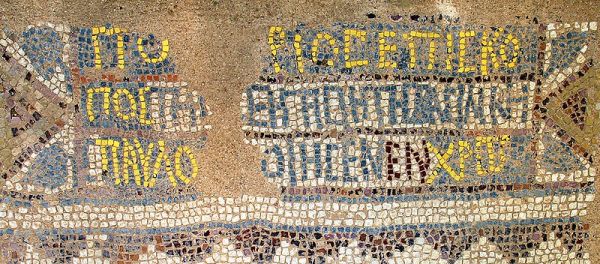
Inscription to Bishop Porphyrios, Philippi (325)
For Reflection:
- Check out Paul and Silas in prison in Philippi - singing, praising God, until deliverance came; this was the context of the beginning of the Philippian church.
- "I pray that your love will overflow more and more, and that you will keep on growing in knowledge and understanding." (1:9). How can you see that working out in your life?
- "For me to live is Christ" - what does that mean to you?
- "I trust that my life will bring honor to Christ." (1:20). Nothing less!
- "you have been given not only the privilege of trusting in Christ but also the privilege of suffering for him" (1:29) - does suffering as a Christian enter into your calculations?
- Epaphroditus put himself out to help Paul and it nearly cost him his life. What does sacrifice in serving God by serving others mean to you? What are your limits?
- "God, who began the good work within you, will continue his work until it is finally finished on the day when Christ Jesus returns." (1:6) - do you believe this? what does it mean in your life? Think about the purpose & assurance it gives. Trust Him.
- "you must live as citizens of heaven" (1:27) - how do we do that, in practical terms?
- "everyone looks out for their own interests, not those of Jesus Christ." What a state of affairs! It is easy (and natural to non-Christians) to act out of self-interest, but God wants to change that in our motivations, priorities and relationships.
- "Fix your thoughts on what is true, and honorable, and right, and pure, and lovely, and admirable. Think about things that are excellent and worthy of praise." (4:8).
- Try being content with what you have (4:11-13).







